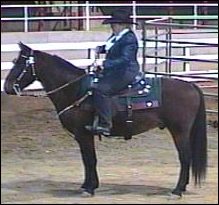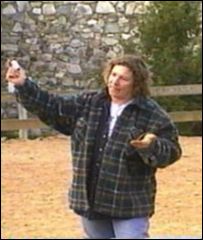|
History of Wild Horse Workshops:
The workshops include adoptions and a week of actual wild horse gentling and training activities.
Interested parties can enroll to participate "hands on" in the clinic as well as spectate.
1SG Mark Atwood, Frank Bell and John Sharp continued as part of the clinician staff.
Cher Eastep of Colorado and Robert Denlinger of Kentucky have joined the gentling team in 1999
and added demonstrations on clicker training. Hue Simpson of California continued to present
her "Focus Training" techniques which are based in part on TTeam.
The BLM portion of the 1999 workshop was co-hosted by BLM's Jackson, MS and
Milwaukee, WI offices. Art Degrazia and Jinx Fox were the lead personnel from
the BLM offices. Least Resistance Training Concepts organized the
educational and clinical portion of the event. Jill Whitt was workshop
director this year with our beloved "Col." Cher Eastep assuming a good portion
of the program's managerial duties.
Director Jill Whitt and her
wonder horse "Christy"

|
"Col." Cher Eastep

|
A "moonlight" adoption was held on the first evening of the workshop.
Gentling and training went on for the entire week and a full adoption
was held on the Saturday following the week's activities. All but a handful of horses found homes.
- 48 mentors participated in the workshop.
- 24 horses were gentled.
- 40 horses were adopted.
- 5 problem horses were worked.
| 
